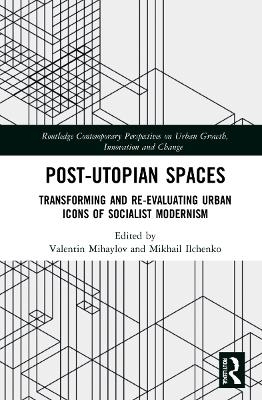
Post-Utopian Spaces
Routledge (Verlag)
978-1-032-19769-2 (ISBN)
With contributions from leading scholars in the field, this book prioritises objective scientific knowledge and presents expert rethinking of the historical experience of urban planning in the former socialist countries of Eurasia. It draws on carefully selected examples of iconic cities of socialist modernism, from the post-Soviet space, Central Europe, and the Balkans. The book explores the ongoing transformation of these cities: from uniformed urban environment to chaotic post-modernist planning, from industrialisation to touristification, from deideologisation to making new and still highly contested heritage.
Written in an accessible and engaging style, this book will be of interest to students and scholars in urban studies, human geography, sociology, social anthropology, spatial planning, and architectural practice.
Valentin Mihaylov works in the Institute of Social and Economic Geography and Spatial Organisation at the University of Silesia in Katowice, Poland. His scholarly interests are focused on national and territorial identities, urban studies, political geography, and geopolitics, with particular attention to the Balkans and East-Central Europe. He authored scientific publications in Bulgarian, English, Polish, Russian, and Serbian, including six books. Dr. Mihaylov recently published the collective volume Spatial Conflicts and Divisions in Post-Socialist Cities as an editor. Mikhail Ilchenko works as a researcher at the Leibniz Institute for the History and Culture of Eastern Europe in Leipzig. His studies focus on various aspects of urban transformations in Eastern Europe and social history of architecture, with particular interest in changing perceptions and public attitudes towards the modernist architectural heritage. His articles on post-socialist transformations and modernist urban heritage are published in various journals and edited volumes in English, Russian, Ukrainian, and Polish languages.
1.Introduction: Socialist Urban Utopias and their Continuing Transformations. 2.Rises and Falls of New Socialist Cities. 3.Uralmash: Re-Imagining Utopia, Re-Constructing Urban Space. 4.Zaporizhzhia: The Socialist City as a Cultural Model. 5.Tychy: From a Dormitory Town to a Large Industrial Centre. 6.Eisenhüttenstadt: Urban Heritage in Transformation. 7.Ostrava-Poruba: A ‘Pure’ Socialist City in Change and Permanence. 8.Dunaújváros: Transforming and Re-Branding the Largest New Town of Hungary’s State-Socialist Era. 9.New Belgrade: From a Socialist Ideal to a Fragmented Space of Fashionable Architecture. 10.Dimitrovgrad: a Bulgarian Construction of the 20th Century. 11.Velenje: A Local Community’s Quest for Its Town Heritage and Identity. 12.Conclusion: Post-Utopian Spaces in Search of Alternative Urban Policies.
| Erscheinungsdatum | 17.08.2022 |
|---|---|
| Reihe/Serie | Routledge Contemporary Perspectives on Urban Growth, Innovation and Change |
| Zusatzinfo | 2 Tables, black and white; 1 Line drawings, black and white; 49 Halftones, black and white; 50 Illustrations, black and white |
| Verlagsort | London |
| Sprache | englisch |
| Maße | 156 x 234 mm |
| Gewicht | 453 g |
| Themenwelt | Naturwissenschaften ► Biologie ► Ökologie / Naturschutz |
| Naturwissenschaften ► Geowissenschaften ► Geografie / Kartografie | |
| Sozialwissenschaften ► Soziologie | |
| Technik ► Architektur | |
| ISBN-10 | 1-032-19769-2 / 1032197692 |
| ISBN-13 | 978-1-032-19769-2 / 9781032197692 |
| Zustand | Neuware |
| Informationen gemäß Produktsicherheitsverordnung (GPSR) | |
| Haben Sie eine Frage zum Produkt? |
aus dem Bereich


